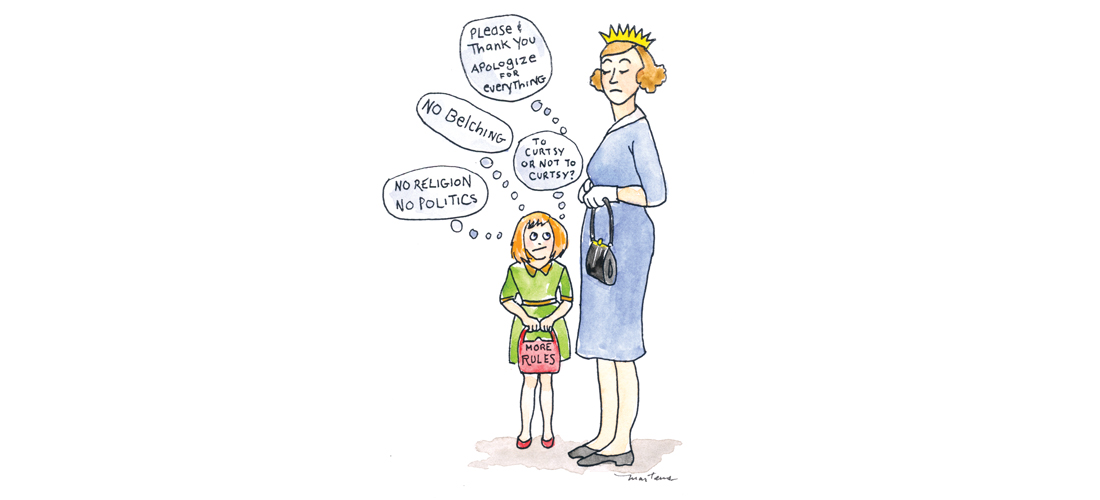
Not-So-Polite Company
A comedy of manners
By Jane Borden
Everyone is someone else’s intruder. I certainly felt like one when I first met Nathan’s family. They did nothing to make me feel that way, I should clarify. But I still did. Gaining in-laws is like joining the Witness Protection Program: You get a second life, but it’s full of strangers. Nevertheless, they were now part of my closest circle, as if the word “insider” were a contronym. Nathan had once been completely unknown too, of course, but the time span comprising his transition to life partner was longer than one weekend.
For the record, my in-laws are great. We loved and accepted one another immediately. But even those circumstances can’t mitigate the strangeness of the scenario. Hey, people I hardly know, let’s do Christmas biannually until we die! Yes, technically, it is a choice based on DNA, but it’s not my DNA.
In at least one way, in-laws are even further from family, on the relationship spectrum, than strangers are. I am way more polite to my in-laws than I am to almost anyone else. As a child, when I protested the practicality of the regimented system of traditional manners I was taught, my parents’ response was, “You might meet the Queen of England one day.” This is a ridiculous statement. When would I meet the Queen? When she visited North Carolina because of her interest in tobacco farming and Michael Jordan? Or would it be when I was knighted for my contribution to the junior-dance arts? Further, if I did meet her, how would she know that the reason I wasn’t discussing money was simply because it hadn’t come up yet?
Nevertheless, the specter of this future royal meeting endured, precisely because it is an unfalsifiable argument. But now I also understand it to be a metaphor: The Queen of England is my mother-in-law. Somewhere a needlepointed novelty pillow is smiling. And so, I reserve my most respectful comportment for her.
As examples, I’ve put together this list of behaviors, categorized by whether or not I will exhibit each behavior in front of in-laws, strangers, or family.
Belching:
In-laws: Never.
Strangers: Occasionally, by accident, and always followed by apology.
Family: Often. Then my sisters shout, “Good one!” — and my mother dies inside.
Talking about religion or politics:
In-laws: Never.
Strangers: Sometimes. This is why Twitter exists.
Family: My parents’ frequent suggestion that I “grow up to be a lawyer” was really just their exit strategy from arguments.
Sarcasm:
In-laws: Rarely.
Strangers: It’s how I make friends.
Family: I hardly see them when I visit because my eyes are rolled so far back into my head.
Criticizing them:
In-laws: Never.
Strangers: When I am in my car and can safely drive away.
Family: I’m beginning to wish I hadn’t made this list.
Taking advantage of hospitality:
In-laws: Never.
Strangers: I tidy after myself in hotels.
Family: I walk in the door and I’m 16 again.
Walking around in pajamas:
In-laws: Almost never.
Strangers: It’s how I bank.
Family: I hardly packed anything else.
Complaining:
In-laws: Never.
Strangers: This is what Facebook is for.
Family: I definitely shouldn’t have made this list.
Drinking too much:
In-laws: Never.
Strangers: This is what strangers are for.
Family: Only in the summer, at the beach, every summer, for an entire week.
Arguing over who’s paying the check:
In-laws: Never.
Strangers: Never.
Family: Never.
I need to apologize to my family. I don’t know why they still claim me, but I’m assuming it’s because I have their granddaughter. Since she is also Nathan’s, my in-laws have less incentive to keep me around, and this is precisely why I behave around them. I still live in fear of them calling him to say, “Think about your daughter, Honey — what if sarcasm is genetic?”
It’s a silly fear, I admit. It’s not like washing dishes and avoiding politics obscure my other faults. So, clearly they have already accepted me, including never called to warn him that I’m a bigot.
I should explain. Before Nathan and I were engaged, he invited me to Indiana to meet his family. Part of the trip included a drive north to his grandmother’s lake cottage. For about 30 minutes of that afternoon, while Nathan ran an errand, she and I were alone together, sitting on lawn chairs facing a small waterway that connects two sections of the lake. While we chatted politely, a pontoon boat rumbled down the waterway, propelled by an outboard motor and carrying close to a dozen Amish teenagers.
“Interesting,” I said. “They’re using a motor.”
“Yes,” she replied. “Interesting.”
Then I remembered that Amish communities encourage adolescents to spend a period of time away from their culture and its rules, in order to strengthen their faith upon returning. This rite of passage is called Rumspringa. So I said, “Maybe they’re on their Rumspringa.”
Then there was a period of silence, after which Nathan’s grandmother replied, sternly, “Well, I think the Amish are very nice people.”
Wait, what?
“I do too,” I protested. “What did you think I said?”
After a brief silence, she asked, “Well what did you say?”
“That maybe they’re on their Rumspringa.”
More silence, until, finally: “Hmm. Yes. Well.”
Then she changed the subject. What could I do? Argue with a nonagenarian hosting me in her home, a tactic that would surely make whatever happened even worse? Instead, I let it go. I let her think I hate the Amish.
What an unlikely group to disparage! That’s exactly how bigoted she must think I am — if you hate a group of hardworking, simple-living Christians, whose entire belief system is rooted in pacifism, then you have cast a wide net of hatred. No wonder she changed the subject: She was probably afraid I’d start in on the Quakers.
Further, she believes I was confident enough in said bigotry to casually drop it in front of a woman I’d never met, who also happens to be my boyfriend’s grandmother. One question remains: What did she hear when I spoke? “Rum slinger?” “Gun singer?” ”Their lack of alcoholism and generally quiet nature are ruining this country?”
I’ll never know. But here are some things I do know, after doing some reading about the Amish way of life. Not all communities abstain from the use of all electronic or motorized devices. Rather, each group’s church leaders approach powered appliances on a case-by-case basis. So it’s possible these teenagers use outboard motors often, regardless of whether they were on any kind of culturally sanctioned break from the religion’s rules. Further, that time period is not always referred to as a Rumspringa. And whatever you call it, it isn’t really a time of partying. Most Amish adolescents don’t live outside the home during this period, or booze it up, or blare rock music. The period is mostly marked by a higher degree of socializing and courting, in advance of making the decision to be baptized and join the church.
In other words, during my lakeside conversation with Nathan’s grandmother, I unfairly defined an entire group by the behaviors of only a handful of its most visible members, which is literally part of the definition of racism. Grandma was technically right.
On the car ride home, I told Nathan what happened. But there was something he didn’t tell me until much later: Earlier that afternoon, after she and I had been alone together, he shared with her that he planned to propose to me. And she said nothing to him about the Amish incident. I may be a bigot, but you know what they say: The hottest places in hell are reserved for those who stayed silent.. OH
Greensboro native Jane Borden continues her own Rumspringa in Los Angeles.





